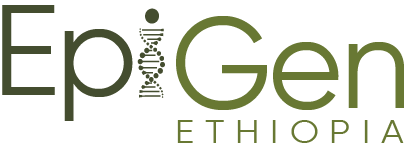EpiGen Ethiopia holds first in-person kick-off in Addis Ababa
Last 18-20 September 2023, the highly anticipated in-person EpiGen Ethiopia project kick-off took place at the National Training Centre of the Ethiopian Public Health Institute in Addis Ababa, Ethiopia. The meeting was opened by Dr. Geremew Tasew (Director for Bacterial, Parasitic, and Zoonotic Diseases Research Directorate at EPHI), Dr. Getachew Tollera (Deputy Director, EPHI), followed by Dr. Mebratu Massebo (Senior Advisor to the Minister of Health, Dr. Lia Tadesse) and the Deputy Director for the Amuer Hansen Research Institute (AHRI), Dr. Alemseged Abdissa. With over 100 attendees, the kick-off was well attended with representation from all partner institutes, as well as the Africa CDC, Harari Region Health Office, Gembella Regional Health Office, Benishangul-Gumuz Regional Health Office, Sidama Regional Health Office, and the Central Ethiopia Regional Health Office.
The opening was followed by an introductory session by Prof. Tobias Rinke de Wit, the Scientific Lead of the project, stating that EpiGen Ethiopia aims to build a national molecular pathogen epidemiology network in Ethiopia with real-time digital dashboards for making policy with respect to imminent outbreaks of infectious diseases. He shared,
“Unfortunately, overall climate change developments are already widely felt in Ethiopia. These will increasingly contribute to future epidemics.”
Extensive droughts are forcing people to move to more inhabitable areas, crowding together in growing mega-cities like Addis Ababa. The geographic spreading of mosquito vectors for diseases like malaria and dengue is exacerbated by increased temperatures. And increasing scarcity of clean water coincides with cholera and typhoid outbreaks. An early warning network like EpiGen is therefore timely and becoming more necessary. The additional potential of this network to identify mutations through DNA sequencing of pathogens will additionally contribute to the battle against antimicrobial resistance.
Prof. Tobias in 1995 (Left) and in 2023 (Right) in front of the Ethiopian Public Health Institute.




Tuesday and Wednesday were spent with EpiGen Ethiopia’s inner team of 12 partner institutions in a workshop to concretize EpiGen Ethiopia’s next steps. Dr. Dawit Wolday made an excellent summary of the overall project management structure. Later in the week, Prof. Tobias Rinke de Wit, and Dr. Dawit Wolday, the two Principal Investigators of the project, visited the Africa CDC buildings in Addis Ababa. They were kindly invited for a tour through the brand-new premises by Dr. Sofonias Kifle Tessema. They stood in awe in front of several Biosafety Level-3 (BSL-3) laboratories and learned that a future BSL-4 lab is being constructed, for the highest level of safety when working with viruses like Ebola.
For Prof. Tobias, this was his work coming full circle:
“It was a bit of a Magical History Tour, going back to Ethiopia this October and meeting the research institutes that I worked with over 25 years ago in Addis Ababa. The city has changed tremendously. From an estimated 1 million citizens in ‘my time’ to over 10 million today. Skyscrapers now line the city’s boulevards. An almost unsurpassable ring road and a new monorail on the central Meskel Square are now present. We visited the Armauer Hansen* Research Institute (AHRI) in its old building and admired its new premises, soon to be opened. AHRI is where I started my career in Africa in 1990 as a senior scientist working on a potential vaccine against leprosy and now, with EpiGen Ethiopia, I am back. It feels like things are coming full circle. Finally, we took the opportunity, together with our EpiGen Ethiopia colleague Prof. Denise Naniche from ISGlobal Barcelona, to write another proposal for a first-round EDCTP funding that can build on EpiGen Ethiopia’s networks. Our fingers are crossed! It was definitely a productive week in Addis Ababa.”
With the looming threat of diseases merely waiting for the right opportunity and conditions to evolve and spread, it is crucial that projects like EpiGen Ethiopia become widespread throughout the world. While we cannot yet effectively prevent the evolution of viral diseases, pathogenic surveillance systems provide us with more time to brace ourselves and possibly save lives. Climate change, increasing urbanization and globalization, and healthcare inequities continue to deepen and complicate the challenge of addressing infectious diseases in the future. Our hope is that the knowledge gained from this project will contribute to the development of other pathogenic surveillance systems and to a larger, more holistic answer to the evergrowing threat of infectious diseases.
EpiGen Ethiopia is supported by the Global Health EDCTP3 Joint Undertaking and its members.
* Armauer Hansen was a Norwegian physician who in 1873 identified Mycobacterium Leprae as the causative agent of leprosy.


